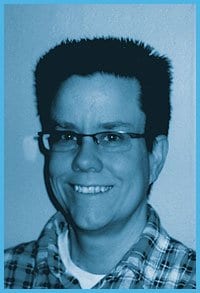A few weeks ago, 15-year-old Joshua Melo hung himself after months of homophobic bullying at his high school in Strathroy, Ontario. Situated on the banks of the Sydenham River 35 miles west of London, this community of 12,500 is a cultural mix; descendants of Irish settlers among later waves of Dutch Calvinist and Portuguese immigrants; hardworking, law-abiding, God-fearing people. The town motto is “We Progress.”
I usually like to say I’m from Strathroy: Turkey Capital Of Canada. Home of the Turkey Festival, the Turkey Queen, turkey races. Do you know how they race turkeys? Two lanes of snow fence, two turkeys and two guys with brooms.
I lived in Strathroy for four years, after my parents swapped suburban life for a tin can in the seniors’ mobile home park on the outskirts of town. Like Joshua, I attended Strathroy District Collegiate Institute. I was a year ahead of his father, John, though I didn’t know him well.
I overcame the stigma of being “the new kid” and living in “the park” and made some friends – most of them turned out to be gay. In grade 12 I came out to a few friends and teachers, to mixed reactions including an invitation to join in prayer for my salvation. I muddled through the rest of high school and, unlike Joshua, I got out of Strathroy alive, thanks to a few good people and probably my gender.
The bullying which lead to Joshua’s suicide unfolded against a backdrop of debate in recent months about whether or not the Thames Valley District School Board, which includes Joshua’s school, should teach children about homosexuality and tolerance. Sadly, while such debates drone on, kids get the distinct impression that adults can’t decide whether or not gaybashing is actually wrong. In that vacuum homophobia persists; the deadliest weapon in the bully’s arsenal, the most widely condoned brand of discrimination, the one that still gets a wink and nod from some of the pulpits in Strathroy.
A similar morality debate raged when I was in high school, resulting in the banning of books in London-area high schools including those by such CanLit heavyweights as Margaret Atwood and Margaret Laurence. The most absurd, however, was the banning of half of Hugh MacLennan’s Two Solitudes. First published in 1945, the story is presented in two parts; the first set in rural Quebec as World War I draws to an end, the second a generation later in Montreal. We were only allowed to study the first part, about the constancy of parochial life, not the racier second part, about the changing face of urban Quebec. One Solitude, we called it.
It’s almost unbearable for me to think of the dilemma Joshua faced. On the one hand he endured verbal and physical abuse. On the other, he surely hesitated to expose his sexual orientation (whatever it was) to the scrutiny of friends, family and teachers in a community so strongly divided on the issue.
It’s been a long time since I’ve thought about being 15 years old – powerless, vulnerable, thrilled and terrified, desperate to find a way out. I finished high school on a Friday, started a full-time job in Toronto on Monday, and went to my first Toronto Gay Youth meeting on Wednesday. Like most urban queer folk (and let’s face it – that’s most queer folk), I left my small-town life the minute I could, and built an insular life for myself among my own people without a backward glance.
Back then the best we hoped for was that people would be civil toward us, and we took the threats and the knocks as inevitable. The idea of homophobia had barely emerged; it certainly was not part of our everyday lexicon.
When I consider the tremendous social and legislative strides lesbian and gay people have made in the past 25 years I am only more deeply troubled by Joshua’s story, by how little has seemingly changed. For him, and the thousands like him in this country who are in powerless, oppressive circumstances, Church and Wellesley might as well be on another planet.
“We Progress”? Not in Strathroy.
* Noreen Stevens now lives in Winnipeg and has recently wrapped up her Chosen Family comic strip.

 Why you can trust Xtra
Why you can trust Xtra


